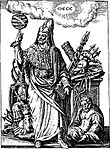
Back هرمس الهرامسة Arabic هرمس تریسمجیستوس ARZ Hermes Trismegistus Azerbaijani Гермес Трысмегіст Byelorussian Хермес Трисмегист Bulgarian Hermes Trismegistos Breton Hermes Trismegist Catalan Hermes Trismegistos Czech Hermes Trismegistus Welsh Hermes Trismegistos Danish
| Part of a series on |
| Hermeticism |
|---|
 |
| Part of a series on |
| Esotericism |
|---|
 |
Hermes Trismegistus (from Ancient Greek: Ἑρμῆς ὁ Τρισμέγιστος, "Hermes the Thrice-Greatest"; Classical Latin: Mercurius ter Maximus) is a legendary Hellenistic period figure that originated as a syncretic combination of the Greek god Hermes and the Egyptian god Thoth.[1] He is the purported author of the Hermetica, a widely diverse series of ancient and medieval pseudepigraphica that laid the basis of various philosophical systems known as Hermeticism.
The wisdom attributed to this figure in antiquity combined a knowledge of both the material and the spiritual world, which rendered the writings attributed to him of great relevance to those who were interested in the interrelationship between the material and the divine.[2]
The figure of Hermes Trismegistus can also be found in both Muslim and Baháʼí writings. In those traditions, Hermes Trismegistus has been associated with the prophet Idris (the Biblical Enoch).
- ^ A survey of the literary and archaeological evidence for the background of Hermes Trismegistus as the Greek god Hermes and the Egyptian god Thoth may be found in Bull, Christian H. (2018). "The Myth of Hermes Trismegistus". The Tradition of Hermes Trismegistus: The Egyptian Priestly Figure as a Teacher of Hellenized Wisdom. Religions in the Graeco-Roman World. Vol. 186. Leiden and Boston: Brill Publishers. pp. 31–96. doi:10.1163/9789004370845_003. ISBN 978-90-04-37081-4. ISSN 0927-7633. S2CID 172059118.
- ^ Van den Broek, Roelof (2006). "Hermes Trismegistus I: Antiquity". In Hanegraaff, Wouter J. (ed.). Dictionary of Gnosis and Western Esotericism. Leiden: Brill. pp. 474–478. ISBN 9789004152311. p. 474.